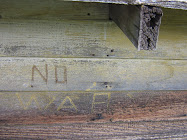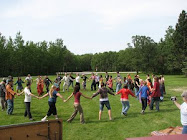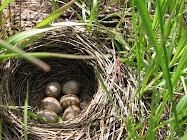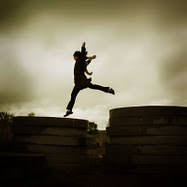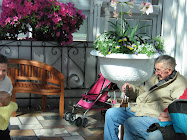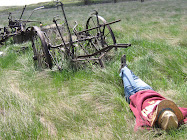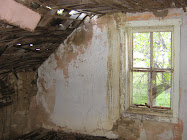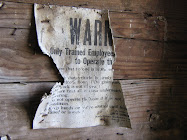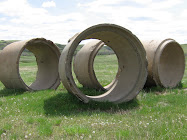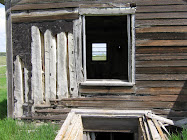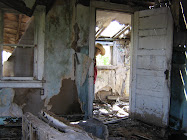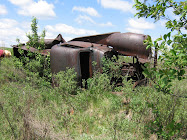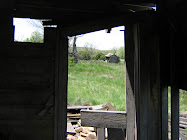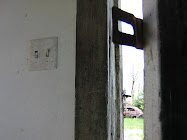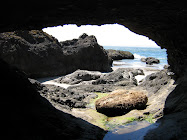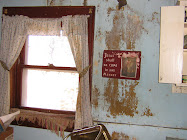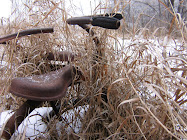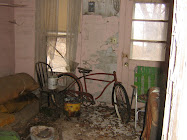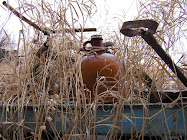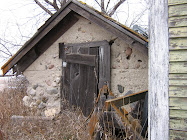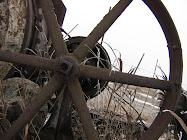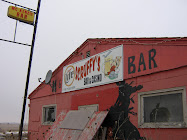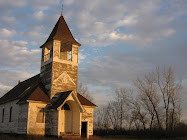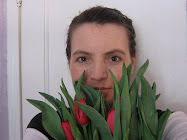Friday, February 20, 2009
The Great Turning: From American Empire to...Drag Show?
It was at a Drag Show, of all things. My introduction to Professor Hal Bertilson's peace ideology came at a Drag Show. I didn't actually spot Professor Bertilson in the Drag Show aisles (or on stage in a sequined dress). But on Sunday morning, as I listened to him speak (in tweed coat and trousers) at the Unitarian-Universalist Fellowship, I kept sensing the connection. What did Saturday's Drag Show have to do with Sunday morning's service? That's what I intended to figure out!
A Drag Show, as you probably know, often features both Drag Queens and Drag Kings. Generally, Drag Queens are men who dress and entertain in an exaggerated womanly fashion. I'm told that the term "Drag Queen" comes from early-20th-century English slang, where "Drag" meant clothes and "Queen" referred to the affected royalty of the performers. By extension, a Drag King is usually a woman who dresses and performs in exaggerated manly (kingly) fashion. Saturday night's Drag Show in Bismarck offered an array of North Dakota Kings and Queens, lip-syncing, dancing, and displaying on the Civic Center stage.
That was Saturday night.
Fast forward to Sunday morning and Hal Bertilson. Title of his talk: The Great Turning -- Evolution of Community. His purpose: To share insights (and hear ours) about transforming our Empire into an Earth-Based Community. Quite a big topic. (Almost as big as Miss Janessa's hair on Saturday night.)
A special guest from the University of Wisconsin-Superior, Professor Hal Bertilson has studied and taught Peace Psychology for much of his career. A quote from Hal:
"One of the tenets of Peace Psychology is that there is both Direct Violence and Structural Violence. Structural Violence includes conditions where people do not have adequate food or shelter, inadequate health care, degradation of the environment, and the hierarchical domination by a few in a society of the many -- something that Riane Eisler in the Chalice and the Blade...calls Domination and David Korten, in his recent books, calls Empire."
Like David Korten, whose work Hal Bertilson teaches, Hal believes that we, as members of Earth's most recent Empire, can indeed turn away from Empire toward true Community. And we must. As the economy, the environment, the supply of natural resources, all face potential disaster -- the lifestyle of the Empire, the culture of over-use and under-responsibility, must be changed.
We can "build a culture of love and peace rather than hate and fear," he says. "We are living in the Empire where life is hostile and competitive, power is loved, the masculine is dominant, and order is imposed via a dominator hierarchy. We have a choice. We can choose instead Earth Community where life is supportive and cooperative. Humans have many possibilities. Order is imposed through partnership. We cooperate, love life, defend the rights of all, and ensure gender balance."
Hal mentions the work of Riane Eisler, who has shown that people co-existed in peace-loving, Earth-loving cultures for many millennia. Surely Earth Community is within our reach as human beings.
But what's stopping us? How do we interrupt our own intentions? Hal sees mega-corporations, perhaps more than any other entity, as purveyors of the unsustainable Empire.
His recommendation for Wall Street? Let it collapse.
"Spending trillions of dollars trying to fix Wall Street is a fool’s errand," says Hal. Let us build our economy at the local level. "Our economic system has failed in every dimension: Financial, environmental, and social."
He quotes from David Korten:
"Our hope lies not with the Wall Street phantom wealth machine, but rather the real world economy of Main Street, where people engage in the production and exchange of real goods and services to meet the real needs of their children, families, and communities, and where they have a natural interest in maintaining the health and vitality of their natural environment."
So what can we do? According to Hal, David Korten "offers concrete suggestions for people in community working together for...a 'political turning.' A move toward local, human-scale enterprises, by entrepreneurs who are members of the community in which they live, who care about their communities. Local food production. Open political processes. Citizen participation. Direct election -- one person, one vote. Open debates. And so much more..."
That's quite a list of recommendations.
Still, Hal didn't mention Drag Shows. If we'd had a little more time, maybe he would have.
Since last weekend, I'm convinced that Drag Shows can model peacemaking in our world.
Jonathan Schell, Peace Fellow at the Nation Institute, writes about peacemaking all the time. In a recent article, he discusses the combined crises of the economy, environment, nuclear weapon stockpiles, and others. "All the crises display one...common feature," he says. "All have been based on the wholesale manufacture of delusions. The operative word here is 'bubble.' A bubble, in the stock market or anywhere, is a real-world construct based on fantasies. When the fantasy collapses, the construct collapses, and people are hurt."
So here's what I love about North Dakota Drag Shows:
Bubbles collapse all over the place. The bubble in which women look like "women." The bubble where men act "manly." The bubble that separates local folk from the glitzy, sparkling wealthy, our modern-day royalty. The bubble that says only famous equals good.
Before our very eyes, Drag Shows toy with deception. They call our own delusions, as members of this Empire, into question. In so doing, they surprise us, and they delight us. Sometimes, they make us laugh. As we watch performers playing with the bubbles of our Empire, we find that we can live without our delusions.
Here's what I love the most:
It's fun.
When we turn away from Empire, it doesn't have to hurt.
Sunday, February 15, 2009
"Women's Lobby Day" or "Is It Time for You to Run for the ND Legislature?"
I probably never mentioned this, but my career in politics started early.
At age 16, I found myself in Springfield, Illinois, a member of the "38th Session of the Illinois Youth Legislature." We deliberated in the chambers of the real, live capitol, which, as we said at the time, was totally awesome!
The first (and only) bill I ever cosponsored would have (had it passed) created a committee in each school to evaluate the competency of high school teachers. I had hoped that the next generation would get a fair shake at a good education.
Apparently, I'd had enough of the chemistry teacher who named the two smartest boys on Day One and henceforth ignored the rest of us -- as well as the history teacher who blithely joked that Amendments 18 and 19, Prohibition and Women's Suffrage, were just one mistake after another.
Sadly, my high school foray into politics (not to mention chemistry and history) was less than rewarding. But I never quite gave it up. As an occasional lobbyist and forever activist, I've been called everything from sinful to anti-American to a "kook" -- by legislators themselves.
For the above reasons and more, I loved Women's Lobby Day, or Women Empowered Rise, which the ND Women's Network sponsored this Wednesday. The North Dakota capitol felt like home to me that day. I could just about taste the urgency and the hope, a potent combination.
Eight Joys of Women's Lobby Day:
1) Being one of over 100 eager women crowding the halls of the capitol.
2) Hearing women legislators urge all 100+ of us to run for office.
3) Getting newsflashes about bills to better our lives.
4) Listening to Kris Kitko's rousing rendition of "Sisters Are Doing It For Themselves."
5) Chatting with hungry legislators in the lunch line.
6) Sitting on the Senate floor as a special guest.
7) Sharing smiles with both Republican and Democratic legislators, whom I hadn't seen since last session.
8) Being the official photographer of the day -- and having license to put my nose in other people's business.
Half as Many Heartbreaks:
1) Feeling dismissed by my legislator when bending his ear.
2) Hearing the Senate's prayer of the day, in which the guest Pastor praised the North Dakota Senate for being "conservative" and "Bible-believing," and then asserted that in our time, "the consequences of sin" no longer appear to be what they should be.
3) Watching Senator Tim Mathern's bill -- to provide health insurance to 100% of North Dakota's children -- die on the floor of the Senate.
4) Seeing a woman legislator do her part to kill it.
The death of this bill, and the process by which it died, would have shocked me more at age 16 than it did this past Wednesday.
But I can't help believing the next generation will get a fair shake -- one of these days.
Monday, February 2, 2009
On a Scale of 1 to 10, I Give "Milk" a 100
The only reason I'm not watching Milk right now -- it's not currently playing in Bismarck. As my brother said, "This is the kind of movie you wait for." Someday, someone may try to convince me that Sean Penn is not Harvey Milk II, but I will never believe it.
In college, my friend Shashi had a certain fondness for Harvey Milk, but it took me until now to catch on. In addition to inspiring my favorite movie on earth, Harvey Milk's life also inspired a documentary (which Shashi brought to our college), a book, and even an opera.
Some curious facts about Harvey Milk:
1) He began his work for social justice when he was...
A. In his 40s.
B. In love.
C. A camera-shop owner in San Francisco.
D. All of the above.
2) During his career, he...
A. Joined the service.
B. Worked at an insurance company.
C. Served as the first out gay man elected to public office in the U.S.
D. All of the above.
3) He gained prominence in San Francisco by speaking out against...
A. The anti-union stance of Coors Beer.
B. Dog poop.
C. Proposition 6, which would fire all gay and lesbian teachers in California -- as well as any teacher who supported them.
D. All of the above.
4) As a member of San Francisco's Board of Supervisors, Harvey Milk received...
A. Death threats.
B. Come-ons.
C. The loyalty and respect of thousands.
D. All of the above.
5) True or False. Harvey Milk often compared politics to theater.
See you at the theater! Or maybe at the legislative session...
(Oh. And the answers... Everything's true.)
